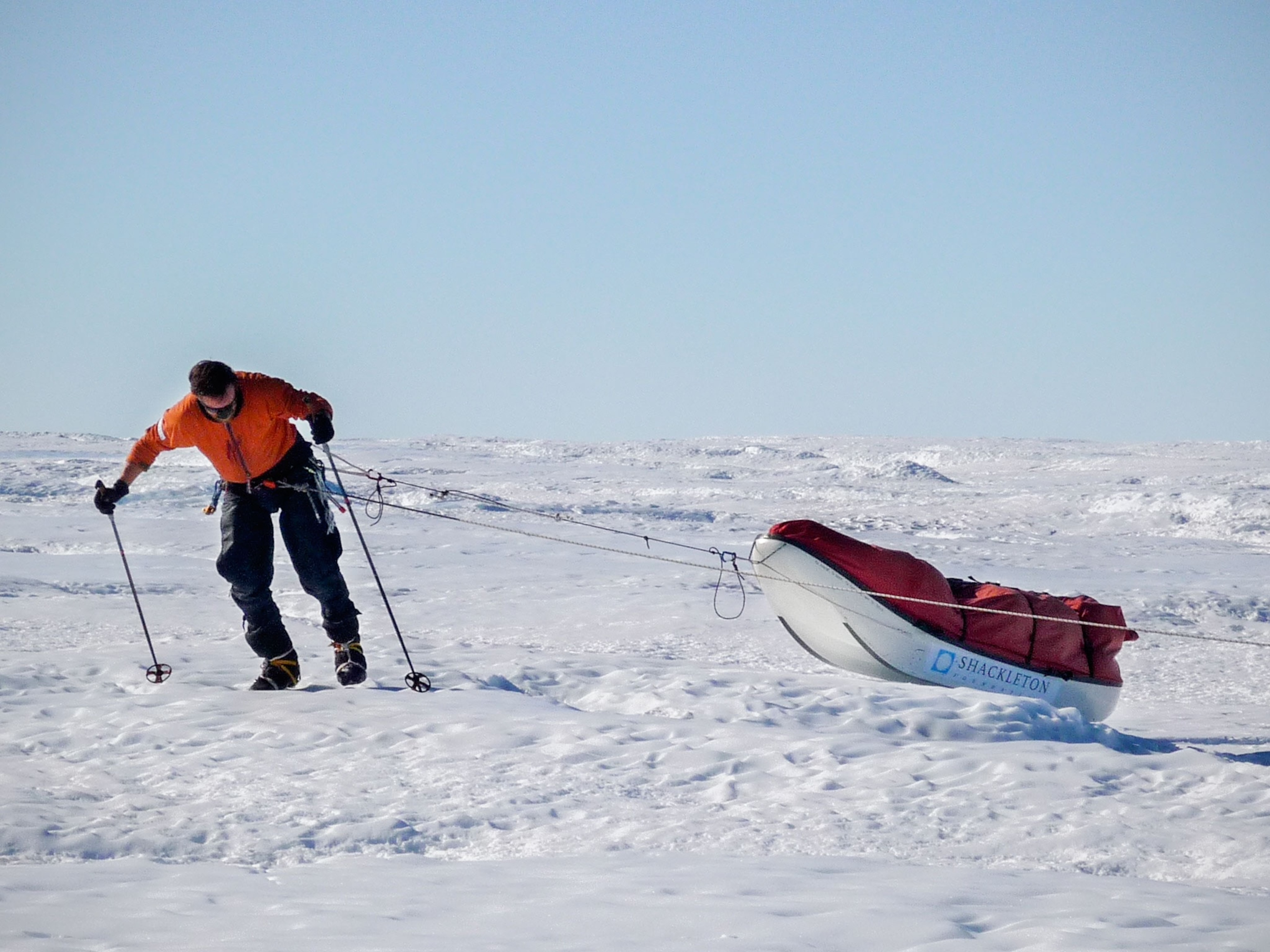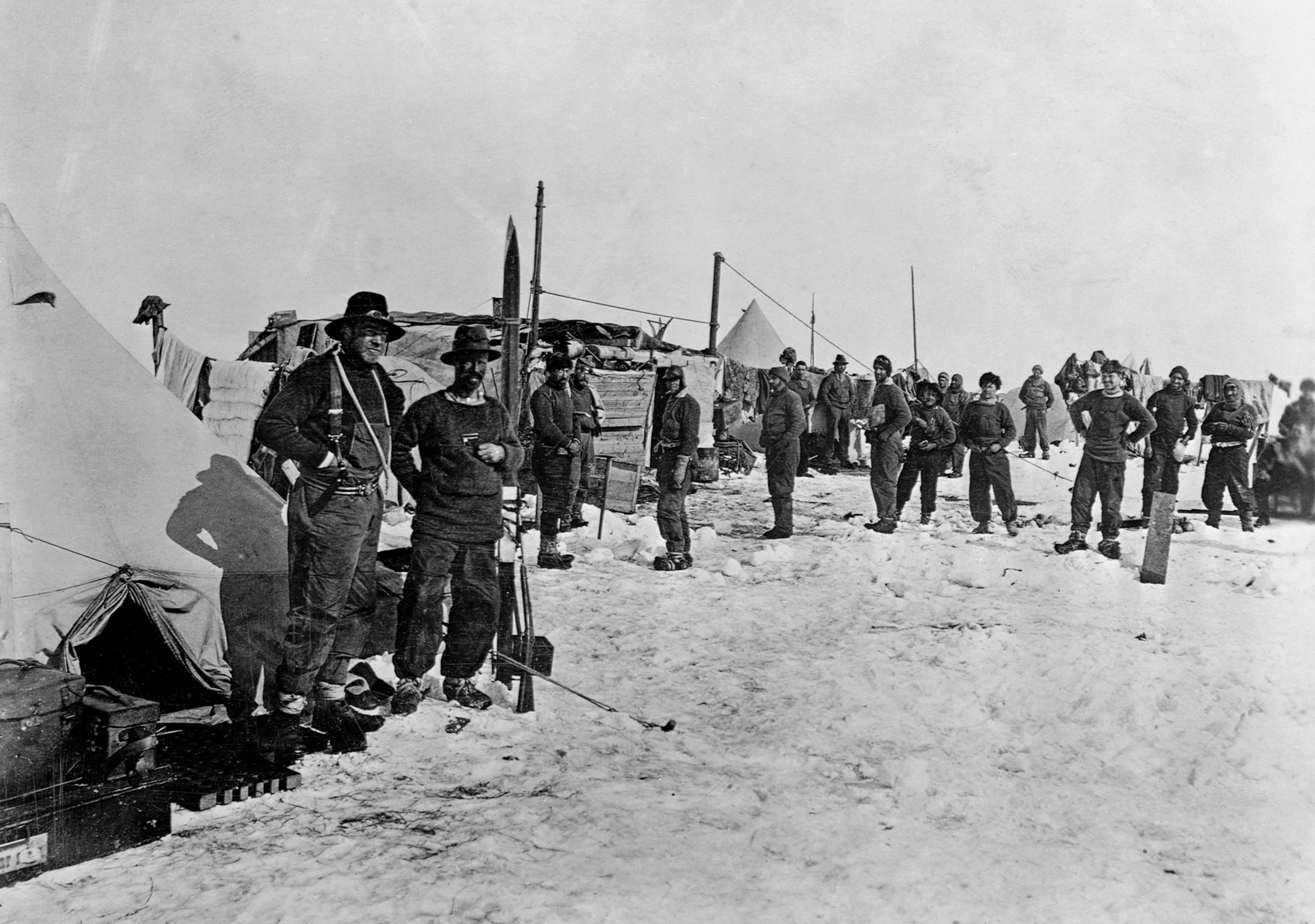
This Man Will Spend 80 Days Walking Antarctica Alone
"I know I'm going to suffer for the first few weeks," says Henry Worsley as he prepares for his trek.
As summer dawns in the Southern Hemisphere, a seasoned Antarctic explorer is hoping to add his name to the Polar record books on the centennial of Sir Ernest Shackleton’s ill-fated Endurance Expedition. Henry Worsley, a 55-year-old British ex-army officer, is endeavoring to become the first person to cross the Antarctic landmass alone, unsupported, and unassisted.
Shackleton never even began his crossing, as his ship was crushed in the ice of the Weddell Sea shortly after he arrived, and he and his 28-man crew spent the next two years in an epic fight for survival. (The first overland crossing was finally accomplished, using mechanized snow tractors, in 1958 by British explorer Vivian Fuchs, supported by Edmund Hillary of Mt. Everest fame.)
Why attempt to walk across the sub-freezing bottom of the world by yourself, without the aid of dogs or kites to propel you or supply drops to sustain you? We caught up with Worsley via Skype as he was gearing up for his expedition in Punta Arenas, Chile. He is awaiting a weather window, and hopes to fly to the Antarctic Logistics and Expeditions (ALE) base on the Union Glacier this week.
A lot of people have traversed Antarctica. So what’s unique about your trip?
A number of expeditions have traversed Antarctica since Amundsen reached the South Pole [In 1911], but they’ve all involved assistance and support in the form of tractors, dogs, kites, and food and fuel drops. Cecilie Skog and Ryan Waters did the first “unsupported” crossing (of the sub-ice landmass) in 2010, but they did it as a pair. I’m trying to be the first to do it alone.

But didn’t the Norwegian explorer Børge Ousland make the first solo-unsupported crossing of Antarctica in 1996-97?
Yeah. And I’ve been in touch with him about his route and itinerary. What he did was amazing, and I’m not worthy to clean his shoes, but he did use a kite [to pull his sled]. Maybe it’s a British thing not to use kites. [Robert Falcon] Scott might have well frowned on the use of kites [as he did on the use of dogs], yet Amundsen would use as many dogs as he could, I expect, and not care what anyone said.
[Editor’s note: Amundsen also used a kite on his sled en route to becoming the first to reach the South Pole]
Why is a human-powered crossing of Antarctica relevant today? Is there any benefit to humankind?
Since I was a child I’ve been fascinated with the history of polar exploration, perhaps in part because Frank Worsley, Captain of the Endurance, is a distant cousin of mine. For the whole of my 36-year career in the army, which I just retired from two weeks ago, I never stopped aspiring to emulate Shackleton’s leadership qualities. And I think it would be a great thing for the world to know more about what kind of man he was. Another reason I’m undertaking this expedition is to leave a financial legacy to benefit wounded soldiers through a charity called the Endeavor Fund.
Your first expedition to the South Pole was in 2007, and you were 48 at the time. Now you’re 55. Why did you wait until so late in life to undertake these polar expeditions?
I’ve looked back on it quite often and thought ‘why the hell didn’t I do this sort of thing when I was in my 20’s and 30’s?’ Well, I was in the army, I had a job, but you can always find a way. I think it’s about having the balls to take that first step, to commit to something big. In those days I didn’t have that. I was nervous. I looked on the negative side like a lot of people do when they’re contemplating a bold and dangerous project. It wasn’t until the centenary of the Nimrod Expedition that I thought: "Enough, I’m never gonna do this, so just get on with it."
With several nations, including China, eyeing resources in the Arctic, some have speculated about Antarctica’s future as a protected wilderness? How do you see the continent’s future?

I would like the world to be sufficiently able to harness renewable energy so as to not even contemplate exploiting Antarctica. Polar adventurers often pretend to be scientists and say that they are going to "raise awareness of global warming" etc, etc. I don’t think people like me can add anything to science through our journeys—everyone knows the polar ice caps are melting.
It would seem that true “firsts” in the world of exploration are becoming more difficult to find. Do you find yourself needing to spin things in such a way that your proposal will resonate with sponsors?
A first helps but is by no means a guarantee of securing sponsorship. And, never spin. You will get found out.
Part of Shackleton’s story that often gets overlooked is that his home life was messy. He left his wife and three children for years at a time and purportedly bounced from one failed business venture to the next. Have you faced any struggles in balancing home life and your polar expeditions?
My first expedition to Antarctica I got terribly wrong. It was a five-year project, and I didn’t involve my wife and children at all. Looking back on it, I’m ashamed. The second expedition was better. These expeditions are very selfish odysseys, and if you don’t have the support back home when you are sliding one ski in front of the other, it can make for a very long trip.

Why are you doing this alone?
What's dawning on me right now as I'm sitting here in my hotel room on my own is that the solo aspect of this journey actually starts the moment you say goodbye to your loved ones at the airport.
I want the success or failure of this thing entirely in my own hands. What's dawning on me right now as I'm sitting here in my hotel room on my own is that the solo aspect of this journey actually starts the moment you say goodbye to your loved ones at the airport. At night I sit in the bar alone as opposed to meeting up with teammates. So, once I get going, that'll actually be quite a relief.
Is there the possibility of rescue if something goes wrong?
Oh, yeah. It's very strictly controlled. I have to make a call every 24 hours to ALE, where they have a doctor and light aircraft. If you miss two of those calls, they'll come and look for you based on your last GPS location. The daily phone call is a slight pain in the ass, but you can cut it down to almost a minute. And then just have the rest of time without the hand of man being anywhere—that's really what I'm after.
You're planning to be alone for approximately 75-80 days, in one of the harshest, most remote environments on this planet. Do you have any self doubt?
No, I don't actually. I know I'm going to suffer for the first few weeks, and I know I'm going to have bad days. There are concerns because I've got a very narrow window in terms of weather, and I'll have to squeeze every bit of juice out of the days I've got to complete this journey. But I'm generally a cup-half-full man, so I'll grit my teeth and get on with it.
How will you feel if you’re out on the Antarctic ice cap, you look out over the horizon and you see someone, and then realize they’re on a converging path with yours?
That would really piss me off.
This interview has been edited for length and clarity.
Mark Synnott is a writer and professional climber based in New Hampshire. Follow him on Instagram and Facebook.